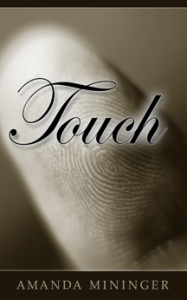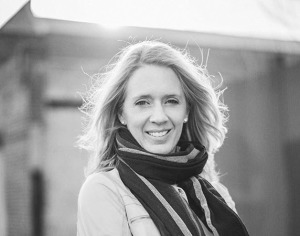Amanda Mininger is a Colorado native, and the author of Touch. Her short story, “Lessons in Greek,” was just published in KNOT magazine. Amanda was kind enough to share some tidbits about Touch, mountain climbing, her latest project, and her writing process with me. More importantly, she shared what she’s learned about herself from the experience of writing a novel.
Please describe your novel in a couple of sentences and the type of reader who might enjoy it.
Well, this is where I flunk self-promotion, because describing my work has always been the hardest thing for me. But I’ll try.
It’s about a woman, Ava, who’s dying and thinking about a former flame, Theo, who challenged her in important ways. They’re no longer together—he’s with someone else—but she knows as her final days draw near that she needs to see him again and make things right. Theo isn’t a very happy guy and is struggling in his marriage. When he finds out that Ava is sick and dying, he starts visiting the hospital where she’s staying, but can never quite make it to her room.
I won’t tell you how it ends, but it basically explores how relationships change us forever, how they create meaning and circumstances and bring people together in ways we can never imagine.
Readers who are not opposed to a little contemporary romance, and who also like to look below the surface of things, seem to respond well to it.
There’s an important scene in Touch that involves the main characters climbing a mountain. Have you climbed any mountains, literally or figuratively?
Yes, both. Living in Colorado, I’ve hiked my fair share of mountains, and even a few fourteeners, which is what Colorado is famous for. In fact, the hiking scene in Touch almost exactly described my experience hiking Mt. Yale several years ago. It was my first fourteener, and mentally and physically grueling. Something about that hike stayed with me. Little did I know that it would come out in my writing later.
And writing a novel is a lot like climbing a mountain. It’s a long, slow, sometimes miserable process, but when you get to the top—or the end, in a novel’s case—you look around and the whole world is at your feet, your head is in the clouds, and no matter how out of breath you may be, it doesn’t detract from the miracle of it all.
What was your inspiration for the bits of magical realism that you included in the story?
I’ve been a fan of Alice Hoffman for years. If you’re familiar with her books, nearly everything she writes is touched with the mystical. I’ve always admired how her characters understand that they are not separate from the magical happenings of nature or the unseen forces around them. They live with them, contemplate them, accept them, even work against them sometimes, but never question them. It echoes my own worldview. So when I wrote Touch, I knew that I wanted it to have a similar feel, to go beyond the pedestrian and the practical-minded, so to speak.
What have you learned about yourself, either from the process of writing Touch or from the story/characters?
The obvious answer is that I learned I could actually finish a novel.
When I was younger, it seemed unfathomable to me. How do people do that? How do they actually sit down and write something from start to finish and then put it out there? I was cursed with starting a lot of stories but never finishing them, and then always cringing and being embarrassed at what I’d written.
But then something happened and a story came to me that I couldn’t ignore. When I sat down to write it, it flowed out of me; I couldn’t have stopped it if I’d tried. So despite all the false starts and insecurities, eventually a true creative door opened and it was like a secret had finally been revealed to me. Touch showed me, through its steady unfolding, who I was and what I was capable of.
If you want to know more about that creative flow and unfolding, I highly recommend Steven Pressfield’s The War of Art, as he describes it infinitely better than I can.
Do you have any advice for someone who’d like to write a novel?
Sit down and do it. See how far you get. If you finish it and you’re happy with it—if even just 10% of it makes you smile—go back and rework it. A novel is never done, so know that part of the process is revising a lot. But eventually it will be done enough.
Then get a trusted opinion. I strongly advise against friends and family, unless your uncle is Ian McEwan or something. No matter what they say, or how much you love or value them, they cannot provide the kind of constructive criticism you need. I’m also not a fan of writing groups and workshops. They may be very helpful to some people, but I’m not sure how productive they are to serious writers.
If possible, find a professional editor who can point out the holes and weak spots. Then consider this advice (some of the best I’ve ever gotten): “If a suggestion doesn’t intuitively make sense to you, let it go.”
The thing is, as writers, we give permission to other people to tell us what’s wrong with our work, and as a result, we stop listening to our inner voices. Don’t do that. Never stop listening to your inner voice. You will know when a suggestion is dead-on accurate, no matter how painful or hard it is to implement. They call it “killing your darlings.” But you will also know when it’s not. Be secure in that knowledge.
What’s the most helpful thing you’ve done to evolve your writing process over the past few years?
I started owning it. For years I said I “wanted to be writer.” Then one day I just started calling myself a writer. Once I wasn’t afraid to say it anymore, I became it. That meant actually sitting down and trying to write something every day. It doesn’t always happen; even now I go through stretches where I put aside my writing for days or weeks on end because I’ve let other things get in the way. But it’s never out of my mind. It’s never not with me. When you identify yourself as a writer, you take steps to keep that reality alive and expanding.
Those steps will be different for everyone and vary in their levels of intensity and professionalism. But for me, it’s finding as many outlets as I can that make sense to my writing. Obviously I write novels. I have a blog. I’ve also been dabbling a lot more in short stories and personal essays. I educate and re-educate myself. I read books on writing, blogs on writing, as well as a variety of fiction, memoir, current affairs, and a couple of literary magazines that I love. I do some writing exercises from time to time, and even did the whole morning pages thing from Julia Cameron’s The Artist’s Way. I didn’t stick with it. Much like meditation, it’s easy to walk away from it with the slightest distraction.
But most importantly, and consistently, I stay open to information in whatever form it takes that makes me say, “So that’s how that works. That’s what I can do better or differently.”
Is there any information you’d like to share about your latest project?
My second novel, Beacon’s Fires, is a pretty big departure from Touch. It’s centered in a small farm town around a group of high school kids, a teacher, and the principal—all who have very specific issues, you could say. It’s darker, weirder, maybe a little controversial—yet it’s also very real, I hope, to the human experience. I grew up in a small town, and in fact I point this out in all my query letters to agents, in case they think I’m approximating the truth of what it’s like, or something.
I love it, though. I love that it’s different from Touch. And gosh darn it, I’ve been writing and revising and fiddling with this thing for years now, so I’m really ready for it to be done. Or at least done enough.
Thanks, Amanda!


Comments are closed.